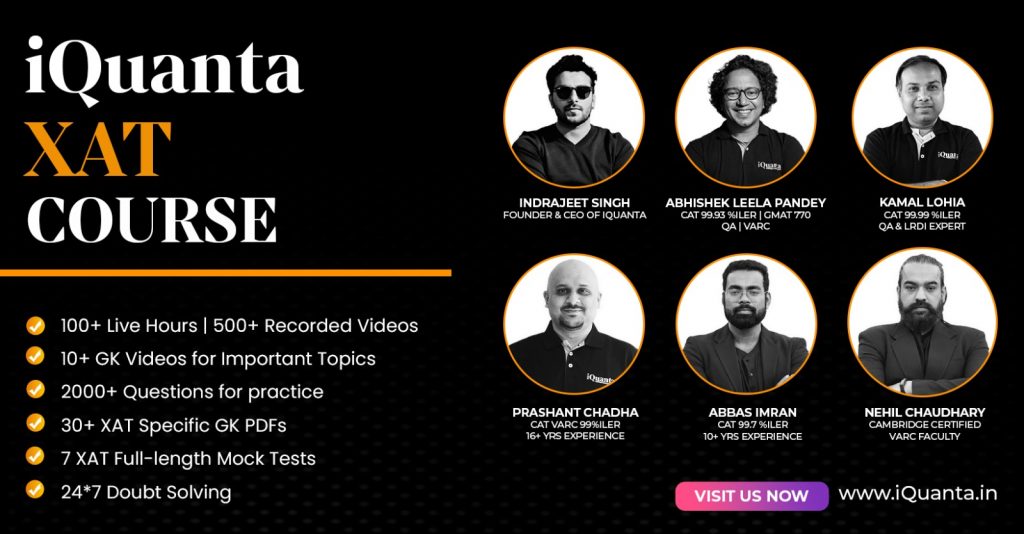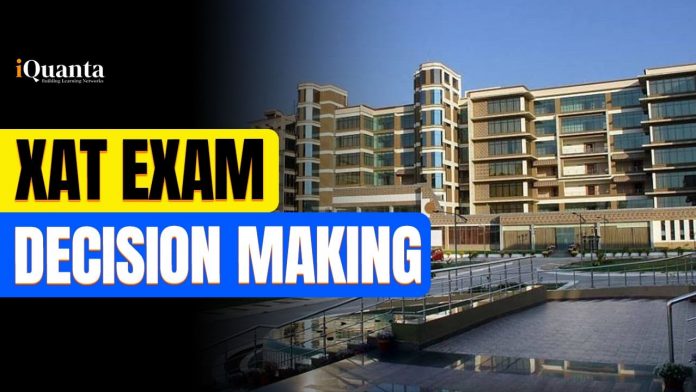The Xavier Aptitude Test (XAT) is one of the most prestigious and widely accepted MBA entrance exams in India. It is organized by the Xavier Labour Relations Institute (XLRI) on behalf of the Xavier Association of Management Institutes (XAMI).
The decision-making section of the XAT is unique and sets the exam apart from other management entrance exams. This section is not about quantitative ability or verbal skills but is a test of the aspirant’s ethical and moral stance. It aims to evaluate the decision-making capabilities of the aspirants in different situations.
This section generally consists of around 20-25 questions. The question formats in Decision Making are primarily based on business scenarios, everyday situations, and problem-solving situations. However, there can be variations, and sometimes questions could be purely logic-based as well.

What Decision-Making Section Demands?
The decision-making section of the XAT exam is not just another component of a standardized test; it carries a profound significance, specifically engineered to assess your managerial decision-making capabilities. This element may seem relatively straightforward on the surface, but it is one of the most intricate yet fundamental facets of MBA. As an aspiring manager, you will be entrusted with the responsibility for your organization’s revenue, the welfare of its employees, and the interests of its stakeholders. As such, the decisions you make are vital, and the complexities surrounding them tend to escalate as you ascend the corporate ladder.
The purpose of the Decision Making section is two-fold. Primarily, it serves to gauge your aptitude as a decision-maker. But more than that, the test has been carefully designed by XLRI to assess your ability to handle ambiguity, complexity, and the interplay of various stakeholders’ interests. Remember, as a manager, every decision you make can create ripples that affect the broader ecosystem of the organization.

How To Approach The Decision-Making Section in XAT
The decision-making section is the make-or-break section of the XAT Exam, like the DILR section of the CAT, The decision-making section exemplifies if you get shortlisted for the further round of the XAT or not. However, where DILR was a test of aptitude, Decision making is a test of Emotional Intelligence from the examiner.
To effectively tackle the questions in this section, you must consider following a strategic approach. Firstly, adopt the mindset of a manager who understands and acknowledges the broad array of responsibilities they carry. Approach each question from a vantage point of leadership and stewardship, keeping in mind the interests of all parties involved.
Secondly, while morality is essential in our everyday lives, it is advisable to compartmentalize it when attempting the decision-making section. Personal moral judgments could cloud your decision-making capability, resulting in biases that might lead you away from the most beneficial decision for the organization as a whole. The key here is to distinguish between personal morality and professional ethics.
Thirdly, prioritize case facts above all else when presented with a question. Every detail provided in the problem statement has its significance and could be critical in forming a well-rounded decision. Make it a habit to note down these facts meticulously to ensure you have all the information at your disposal when you weigh the potential choices.
Lastly, keep a keen eye on ethics throughout the process. While it’s necessary to set personal morality aside, ethics should underpin all of your decisions. XLRI lays particular emphasis on ethics, and rightly so, as any decision in a corporate environment must be ethical to maintain integrity and trust. In the long run, ethical decisions not only protect the organization from potential pitfalls but also foster a culture of responsibility and fairness.
By integrating these strategies into your approach for the decision-making section, you are likely to navigate the complexities of managerial decisions more effectively. Remember, the ability to make sound, ethical decisions in the face of ambiguity is a highly sought-after skill in the world of management.

Format and Content
- Scenario-Based Questions: These types of questions provide a business or real-life scenario where a decision needs to be made. The questions often come with a set of possible solutions, and the candidate needs to choose the most appropriate one. The challenge here is that all options might seem plausible, but one has to choose the best option considering various aspects like ethics, feasibility, and the potential impact of the decision.
- Data-Based Questions: These questions involve the use of charts, graphs, or data to make a decision. Candidates must interpret the data and then make decisions based on their understanding.
- Logical Reasoning Questions: These types of questions require logical thinking to solve. These are less common but can be a part of the Decision Making section.
How To Prepare For XAT Decision-Making
- Practice Case Studies: To improve your decision-making skills, practice case studies from different sources. Analyze business situations and their possible outcomes.
- Improve Your Logical Reasoning Skills: Some questions require logical thinking. You can improve this skill by solving different types of logical reasoning problems.
- Stay Updated with Current Affairs: Understanding the current business environment and socio-political issues can aid in better decision-making. Regular reading of newspapers and business magazines can help.
- Ethics and Morality: Since many of the scenarios deal with ethical dilemmas, having a good understanding of business ethics and morality can help you choose the right option. Reading about ethical cases in business can be beneficial.
Tackling a XAT DM Question
Now let’s try to solve the question
1- Famous, renowned, and respected Doctor
2- Who owns an SUV in a Tier 3 city that is imported (For eg- Landcruiser from Toyota, or GLS from Mercedes)
3- His SUV is diesel, he loves his SUV.
4- Stringent laws are going to come in which will make his car and other cars not viable.
5- His daughter does not like him traveling in his SUV to the office daily as she knows that the SUV is a polluter.
6- The daughter must make a decision that will ensure that there is minimum resistance from her father.
Option A- Little viable, but the man is a renowned doctor who is respected by his patients. People who are this famous often have pride/ego in their public image, thus traveling by Public Transport is definitely not viable. This option if given will face resistance. Imagine going from driving a Landcruiser to coming in an RTC Bus to the office.
Option B- Not at all viable, the man loves his SUV (it is imported so it cost him a fortune, probably over a crore)- can you just take something this expensive? No. It would only make sense if you gift him something equally expensive but again does a Doctor’s family have afforded a crore rupees car again? Will it make sense to throw away such prized utility just for environmentalism? Plus taking something away from him will only attract resistance as it is done without the consent of the other.
Option C- Not at all viable, I guess any automobile enthusiast knows that we cannot just retrospectively put a new combustion method altogether in a car and it requires huge mechanical costs to do so. Can we do that for a Landcruiser? will it make sense to do it for a Landcruiser?
Option D- Little viable, as new laws are kicking in and this will anyhow make his car nonfeasible- it makes sense to sell it and buy something that can actually be used without fear, but again will he be able to sell a Landcruiser of over a crore so easily in a market where Diesel cars are not complying with emission laws. The doctor also loves this car and so may not agree to sell it unless he himself is convinced of this option
Option E( I chose)- Most viable, solves many problems, and goes well with case facts
a) will enable the doctor to use the utility of the vehicle and drive it to the fullest till he himself finds it nonviable anymore. Plus due to maintenance, the doctor himself may not want to drive it daily but rather use it as an enthusiast on weekends.
b) will enable the secretary and doctor both to use a single car to the office instead of two (thus well helping the environment through the logic of carpooling).
c) will ensure that both the secretary and doctor are on time to the office and on the right schedule (any doctor here can tell how important is a secretary for his daily medical work).
d) Actually be practically explained to the doctor that it is better to use something for 2 days rather than 7 (something people trying to lose weight can agree- if you are trying to lose weight you always start with small deficits rather than completely overkill yourself)
e) not an overkill- doing too much of anything is bad and being too environmentally conscious is also going to hurt in the long run

XAT Score Vs Percentile for DM
| XAT DM Marks | XAT DM Percentile |
|---|---|
| 15.20 | 99%ile |
| 12.90 | 95%ile |
| 11.90 | 90%ile |
| 9.80 | 80%ile |
Top Colleges Accepting XAT 2025 Score
| XAT B-School | XAT CUT OFF |
|---|---|
| XLRI Jamshedpur and Delhi (BM) | 93 Percentile- Male, 90 Percentile- Female |
| XLRI Jamshedpur HRM | 93 Percentile- Male Engineer, 90 Percentile- Male Non-Engineer, 90- Female Engineer, 87- Female Non-Engineer |
| XLRI Jamshedpur LSCM | 95 Percentile |
| XIMB Bhubaneshwar | 90 Percentile – Engineer, 88 Percentile- Nopn Engineer |
| XIM HR Bhubaneshwar | 89-92 Percentile |
| IMT Ghaziabad | 90 Percentile |
| Goa Institute Of Management | 80 Percentile |
| MICA Ahmedabad | 90 Percentile |
| TAPMI Manipal | 85 Percentile |
| Great Lakes Institute of Management Chennai | 80 Percentile |


